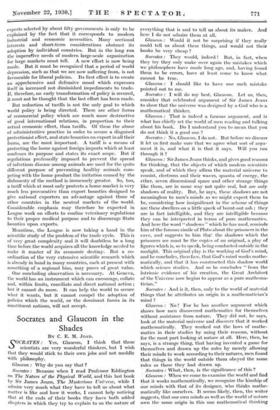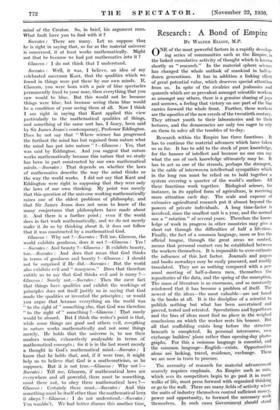Socrates and Glaucon in the Shades
By C. E. M. Jonas.
SOCRATES : Yes, Glaucon, I think that these scientists are very wonderful thinkers, but I wish that they would 'stick to their own jobs and not meddle With philosophy. '
Glaucon : Why do you say that ?
Socrates : Because when I read Professor Eddington on The Nature of the -Physical World, and this last book by Sir James Jeans, The Mysterious Uni,'erse, while I admire very much what they have to tell us 'about what matter is like and how it works, I cannot help noticing' that at the ends of their books they have both added chapters in which they try to explain to us the nature of everything that is and to tell us about its maker. And here I do not admire them at all.
Glaucon : Would it not be surprising if they really could tell us about these things, and would not their books be very cheap ?
Socrates : They would, indeed ! But, in fact, when they try they only make over again the mistakes which we philosophers have made long ago, and, having found them to be errors, have at least come to know what cannot be true.
• Glaucon : I should like to have one such mistake pointed out to me.
Socrates : I will do my best, Glaucon. Let us, then, consider that celebrated argument of Sir James Jeans to show that the universe was designed by a God who is a mathematical thinker.
Clone= : That is indeed a famous argument, and is what has chiefly set the world of men reading and talking about his book. Do I understand you to mean that you do not think it a good one ?
Socrates : No, Glaucon, I do not. But before we discuss it let us first make sure that we agree what sort of argu- ment it is, and what it is that it says. Will you run through it ?
Glaucon: SirJames Jeans thinks, and gives good reasons for thinking, that the objects of which modern scientists speak, and of which they affirm the material universe to Consist, electrons and their waves, quanta of energy, the ether, seven dimensional space and other strange things like them, are in some way not quite real, but are only shadows of reality. But, he says, these shadows are not meaningless to men's minds as we might expect them to be, considering how insignificant in the scheme of things are these dwellers on a little speck of burnt-out ash ; they are in fact intelligible, and they are intelligible because they can be interpreted in terms of pure mathematics. And here the word " shadows " which he has used, reminds him of the famous simile of Plato about the prisoners in the cave, and suggests to him that the shadows which the prisoners sec must be the copies of an original, a play of figures which is, so to speak, being conducted outside in the sunlight. This original play is the working of God's mind, and he concludes, therefore, that God's mind works mathe- matically, and that it has constructed this shadow world which science studies. And so he concludes " from the intrinsic evidence of his creation, the Great Architect of the Universe now begins to appear as a pure mathema- tician."
Socrates : And is it, then, only to the world of material things that he attributes an origin in a mathematician's mind ?
Glaucon : No ! For he has another argument which shows how men discovered mathematics for themselves without assistance from nature. They did not, he says, look at the material universe and discover that it worked mathematically. They worked out the laws of mathe- matics in their studies by using their reasons, without for the most part looking at nature at all. Here, then, he says, is a 'strange thing, that having invented a game for themselves and drawn up the rules by merely allowing their minds to work according to their natures, men found that things in the world outside them obeyed the same rules as those they had drawn up.
Socrates: What, then, is the significance of this ?
Glaucon : When we come to examine the world and find that it works mathematically, we recognize the kinship of Our minds with that of its designer, who thinks mathe- matically like ourselves. It seems likely, then, the writer Suggests, that our own minds as well as the world of nature own the same origin in this one mathematical thinking
mind of the Creator. So, in brief, his argument runs. What fault have you to find with it ?
Socrates : There are many. Let us suppose that he is right in saying that, so far as the material universe is concerned, it at least works mathematically. Might not that be because we had put mathematics into it ?
Glaucon : I do not think that I understand.
Socrates : Well, it was, I believe, an idea of my celebrated successor Kant, that the qualities which we found in things were put there by our .own minds. If,
Glaucon, you were born with a pair of blue spectacles permanently fixed to your nose, then everything that you
saw would be blue. But this would not be because things were blue, but because seeing them blue would be a condition of your seeing them at all. Now I think I am right in saying that Kant applied this view particularly to the mathematical qualities of things, and something of the same sort has, I fancy, been said by Sir James Jeans's contemporary, Professor Eddington. Does he not say that " Where science has .progressed the furthest the mind has but regained from nature what the mind has put into nature " ?—Glaucon : Yes, that was said by Eddington. And you suggest that nature works mathematically because this nature that we study has been in part constructed by our own mathematical minds.—Socrates : That depends on whether the laws of mathematics describe the way the mind thinks or the way the world works. I did not say that Kant and Eddington were right in supposing that they were only the laws of our own thinking. My point was merely that this question of the universe working mathematically raises one of the oldest problems of philosophy, and that Sir James Jeans does not seem to know of the many conjectures that philosophers have made about it. And there is a further point ; even if the world does in fact work mathematically, and we do not merely snake it do. so by thinking about it, it does not follow that it was constructed by a mathematical God.
Glaucon : Why not ?—Socrates : Tell me, Glaucon, the world exhibits goodness, does it not ?—Glaucon : Yes ! —Socrates : And beauty ?—Glaucon : It exhibits beauty, too. Sscrates : And does that mean that God thinks in terms of goodness and beauty ?--Glaucon : I should not be surprised if He did.—Socrates But the world also exhibits evil and " manyness." Does that therefore entitle us to say that God thinks evil and is many Glaucon : Surely not. —Socrates : Then the mere fact that things have qualities and exhibit the. workings of principles does not itself justify us in saying that God made the qualities or invented the principles ; or would you argue that because everything on the world was " to the right of " something else, that. God was therefore " to the right of " something ?.--Glaucon : That surely would be absurd. But I think the writer's point is that, while some things are good and others evil, everything in nature works mathematically and not some things merely. He holds that the universe is; to use their modern words, exhaustiydy analysable in terms , of mathematical concepts ; for it is in the last resort merely a thought in God's mathematiCal mind: Socrates ; I know. that he holds .that, and,, if it 'were true, it might help us to believe that. God is a mathematician, as 1:1. supposes, But it is not true.--Glaucon : Why not !— Socrates; : Tell me, Glaucon, if mathematical laws are everywhere, and all powerful, there must be something, must there not, to obey. these mathematical laws2?-- Glaucon: Certainly there. must.:.--Socrates ,: And' this something must be itself other than the mathematical laWs it obeys ?;—Glaucon : I .do not understand.—Socratis Yoti wouldn't, We'had better discuSs this "another time



















































































 Previous page
Previous page